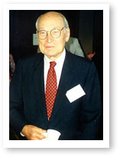Beckman, Arnold O.

| Topics: |
Although close control of acidity is critical in the manufacture of many industrial products, industrial chemists continued to use color tests well into the 20th century and rarely used the pH scale. The first commercially successful electronic pH meter was invented in 1934 by Arnold O. Beckman (1900–2004), then an instructor at the California Institute of Technology. A former classmate of his from the University of Illinois had the job of measuring the acidity of lemon juice for the California Fruit Growers' Association and asked Beckman to devise a sturdier electrical instrument for the task.
To make his original pH meter sturdy, Beckman used the then recently invented vacuum tube. Although he was cautioned against starting up a company to offer a $195 instrument to scientists struggling to keep laboratories going in the middle of the Depression, Beckman went ahead, and the firm was a success. Among its other early products were an ultraviolet spectrophotometer—the Beckman DU (1940)—and an infrared and visible spectrophotometer—the Beckman IR-1 (1942). Today Beckman Instruments manufactures and markets instrument systems for conducting basic scientific research, new product research, and clinical diagnosis—and, of course, for students at all levels.
In 1940 Arnold Beckman gave up his faculty position at Caltech, but he remained deeply involved with education and research, serving on Caltech's board of trustees from 1953—as chairman from 1964 to 1974—and on the governing boards of several other colleges and universities. Through the Arnold and Mabel Beckman Foundation, the Beckmans have contributed substantially to the advancement of education and research nationwide.
Further Reading